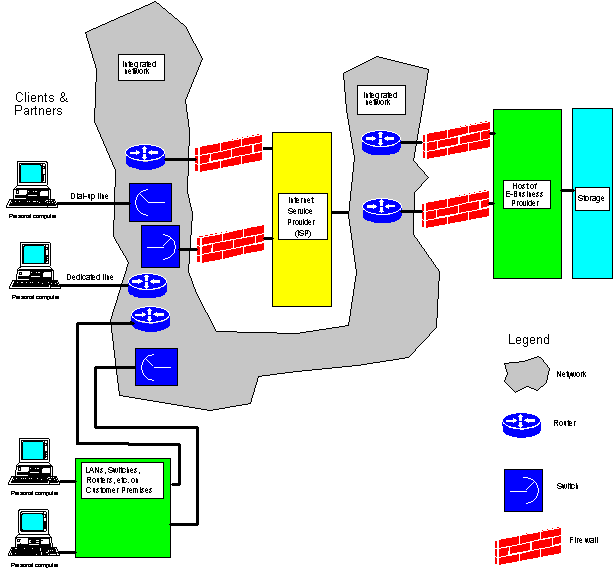E-Commerce
Infrastructure
The diagram below shows an example of an e-commerce
infrastructure. It shows clients, customers, partners and suppliers to the left
and how they may connect to an
Internet company to the right through the Internet.
Clients and partners, using computers, telephones, etc.,
can connect to the Internet through dial-up lines to the public switched
telephone network (PSTN). Through the PSTN Internet Service
Providers (ISPs) can be reached. The ISPs can also be reached through
dedicated lines, as well as switched dial-up and dedicated lines from LANs,
routers, hubs and PBX and other switches on the Customer Premises, i.e. the
premises of the clients, partners, etc.
The PSTN is integrated with other networks, including
packet switched public data networks (PSPDNs)
that use routers and similar switching/directing
devices.
On the other side of these networks you will find the
host computers of the product/service provider or seller. These people may have
co-located or outsourced storage facilities. The latter are data warehouses
containing information on products, services, clients, partners, suppliers,
billing, payments, etc.
Security is of a major concern. This includes concerns
about the following, among many other security problems:
- Credit card numbers, expiration dates, and owner
information getting in the wrong hands.
- Orders being accepted from the wrong clients.
- Payments being made to the wrong sources or goods and
services being delivered to the wrong people.
- Viruses being allowed to pass through the system.
To prevent some of these security problems firewalls are
installed at critical interfaces. The firewalls are supposed to filter the
traffic, inhibit transmission of unwanted information (including viruses), and
prevent malicious or criminal actions by outside persons. However, a firewall
cannot by itself prevent misuse of credit card numbers or identity fraud.

Encryption is a way of improving security. You as a user
can encrypt your messages in an end-to-end fashion and having your correspondent
at the other end convert the message back into the original clear-text.
Encryption can also be used on individual links in the transmission chain.
There has always been a competition between users and
"authorities." Users want secure encryption end-to-end, and government (law
enforcement) agencies want to be able to read your messages and in
particular illegal ones. These agencies may be part of your own government or
foreign governments. We all agree that the traffic of drug dealers, terrorists
and similar persons should be controlled. Some countries make all encryption
illegal, and others, like the U.S. Government, put restrictions on the
complexity of the encryption permitted.
Severe problems in the conflict between users and
government arise when the users are conducting businesses in the multimillion
dollar range with governments. Examples of such users are manufacturers of
telecommunications networks, airplanes, as well as construction companies, etc.
You hear all of them talking about cases where their messages with their local
agents regarding terms and prices end up in clear-text on the desks of their
(government) customers even before their agents receive the messages. This may
mean that the capabilities of government security agencies (like the U.S.
National Security Agency) have been used to intercept and decrypt messages.
Since national security agencies lost most of their "jobs" after the end of the
cold war, some countries are considering using the security capabilities of
these agencies to promote civil business.
The U.S. Government recently relaxed its restrictions on
the export of advanced encryption technology. But, the capabilities of the U.S.
National Security Agency is still ahead...
To view and/or print this document,
click here.
NOTE: Adobe™ Acrobat may be required to read some the
articles listed above. To obtain, click icon.

Back to e-Commerce page